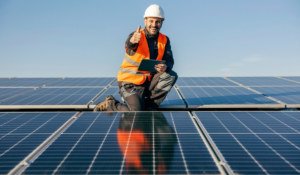Solar panels can still generate electricity during cloudy or rainy days, although their efficiency is reduced compared to sunny days. They work by converting sunlight into electricity through a process called the photovoltaic effect. When sunlight strikes the solar cells, it excites electrons, which creates an electrical current. However, this process is more effective when there is ample sunlight.
During cloudy or rainy days, the amount of sunlight reaching the panels is significantly reduced, which means that the panels produce less electricity.
The extent of the reduction in electricity generation depends on several factors, including the thickness of the cloud cover, the angle and orientation of the panels, and the quality of the solar panels.
Do You Need a Solar Battery During Cloudy or Rainy Days?

Despite reduced efficiency, solar panels can still provide some electricity on cloudy or rainy days. This can be especially important for off-grid systems with energy storage (like batteries) since they can store excess electricity generated on sunny days for use during less favorable weather conditions.
Additionally, some advanced solar panel technologies, like thin-film solar cells, are designed to perform better in low-light conditions compared to traditional crystalline silicon panels.
If you live in an area with frequent cloudy or rainy weather, it’s essential to consider your energy needs and the local climate when designing a solar power system.
To compensate for reduced sunlight, you may need to install more solar panels or invest in energy storage solutions to ensure a consistent power supply throughout the year.